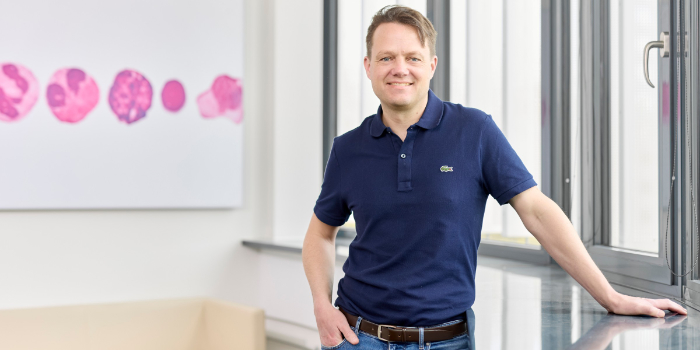NUCLEATE Cluster of Excellence
Beacon of nucleic acid research
22.05.2025
The new NUCLEATE Cluster of Excellence is all about nucleic acids. The research alliance seeks to better understand their various functions and open up new areas of application.
The cluster is jointly coordinated by three universities: Ludwig Maximilian University of Munich (LMU), Technical University of Munich (TUM), and Julius Maximilian University of Würzburg (JMU), with LMU serving as the coordinating lead institution. Veit Hornung, from the Gene Center at LMU, acts as the LMU spokesperson within the cluster’s speaker team. NUCLEATE was selected through a highly competitive, international, peer-reviewed process. It is one of 70 research clusters that will receive funding within the Excellence Strategy, a federal and state initiative in Germany that strengthens top-level research at universities. Funding will begin on January 1, 2026, for an initial period of seven years.

Prof. Dr. Veit Hornung is one of the spokespersons for the new NUCLEATE Cluster of Excellence. © LMU / Stephan Höck
Research focus and scientific approach
NUCLEATE pursues a systematic and innovative approach to nucleic acid research. The aim is to study RNA and DNA molecules not only in their classic role as information storage devices, but also as active regulators and tools. The focus is on three perspectives: nucleic acids as subjects (active molecular actors), as objects (targets of biological regulation), and as tools (basis for therapeutic or technological applications). This conceptual tripartite division allows for a novel structuring of research approaches within the cluster. A particular focus is on elucidating previously unexplored RNA functions, characterizing regulatory networks, and developing new nucleic acid-based technologies, including genome editing, RNA inhibitors, synthetic therapeutics, and diagnostic tools.
Core competence of the LMU Gene Center
The Gene Center plays a key role in the cluster. Several of the cluster’s investigators are based at the Gene Center, including Veit Hornung, Karl-Peter Hopfner, Roland Beckmann, and Julian Stingele. Their work covers central aspects of nucleic acid biology - from genome integrity and RNA processing to innate immunity and the structural mechanisms of gene regulation. The Gene Center combines long-standing expertise with a broad methodological spectrum, including high-resolution structural biology techniques (such as cryo-electron microscopy), biophysical approaches, cell biology, and advanced sequencing technologies. This concentration of scientific and technical competence provides a strong foundation for NUCLEATE’s overarching goal: to gain fundamental insights into the molecular control of cellular processes and to pave the way for new biomedical and technological applications.
Interdisciplinary collaboration and translational focus
A defining strength of NUCLEATE is its highly interdisciplinary structure. The cluster brings together expertise from across the participating institutions, integrating disciplines such as organic chemistry, molecular and cell biology, bioinformatics, immunology, pharmacology, and clinical medicine. This close collaboration across scientific fields and institutional boundaries enables complex biological questions to be tackled from multiple complementary perspectives. NUCLEATE addresses both fundamental research questions and the strategic development of innovative applications. These include new classes of RNA- and DNA-based therapeutics, novel treatment strategies for genetic diseases, next-generation vaccines, and precise in vivo gene regulation technologies. A particular focus lies on overcoming major translational challenges – e.g., the targeted delivery of nucleic acid-based drugs within the body to specific cells and tissues.
Structure formation, promotion of young talent, and future prospects
NUCLEATE is more than a scientific initiative - it is a long-term investment in the research ecosystem. Through the establishment of new professorships, junior research groups, and a joint, inter-university master’s program, the cluster will build a sustainable academic framework that connects the three partner institutions. Early-career researchers will be immersed in a collaborative, interdisciplinary research environment and also gain access to cutting-edge technologies. Over the coming years, NUCLEATE aims to establish itself as one of Europe’s leading centers for nucleic acid research. By promoting scientific excellence, training the next generation of researchers, and driving innovation, the cluster will enhance the international visibility of the field and strengthen the biomedical research landscape in Germany and beyond.

